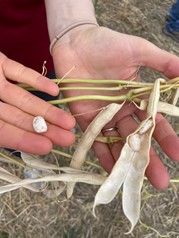Posted by: Chelsea Didinger, PhD Candidate and Horticulture Program Outreach Assistant, CSU Extension
You may have seen snap bean and sugar snap pea plants
in your garden, but raise your hand if you have ever seen a pinto bean plant in
real life. If your answer is no, we have good news for you – Colorado is sixth
in the nation in terms of bean production, and approximately 75% of our dry
bean production is pinto beans. So, keep your eyes open this summer and you may
be able to spot your first Phaseolus vulgaris from the pinto group!
Beans in Colorado
Colorado produces numerous market classes of beans.
Pinto, light red kidney, and Mayocoba (aka yellow) beans are our three main
types, and we also grow great northern beans, black-eyed peas, and others. The Colorado Dry Bean Committee and other
organizations work to support bean growers in our state, and Colorado State
University researches diverse aspects of beans, ranging from nutritional and
health benefits to bean breeding. As gardeners know all too well, growing in
Colorado can be challenging (albeit rewarding). So, what does it look
like growing beans here?
Generally, growers plant beans sometime in mid-May through early-June. Last year (2021) we had a very wet
year in northern Colorado, so some of the farmers I spoke with had to delay planting,
or sometimes even plant less acres. Want to see what a pinto bean planting
looks like? Check out this video taken in Wellington,
Colorado.
 |
Depending
on the variety of bean, harvest occurs about 85-100 days from planting. Beans
are left to dry in their pods in the field. Then, they need to be harvested and
cleaned of dirt and debris before being bagged and sold to consumers. It is a
very labor-intensive process when done by hand and processing equipment can be quite expensive, so often beans are sent to a facility to be cleaned. Want to
see what that all looks like? Check out this video!
 |
Beans are essential to Colorado agriculture for a
whole host of reasons, including:
- Soil health – Beans are a type of legume and can form a symbiotic relationship with bacteria in the soil to fix nitrogen.
- Crop rotation
– Partially due to their nitrogen fixation ability, beans are critical in
rotation with crops like corn, wheat, and sugar beets.
- Sustainable food systems – Beans are more water-efficient than many other crops and can help reduce greenhouse gas emissions.
Fun Facts About Beans
Beans are a hot topic, especially with all the interest in sustainability and plant-based proteins. If you are searching for ways to impress your friends, look no further!
- Black-eyed peas
are generating much interest among researchers right now because they are known
for their drought and heat tolerance, factors which are becoming increasingly important
with our dry and hot summers.
- Beans are a type of pulse.
‘Pulses’ are the dried, edible seeds of non-oilseed legumes and include chickpeas,
cowpeas (like black-eyed peas), lentils, dry peas, and dry beans (e.g.,
pinto, red kidney, Mayocoba, black, etc.). Conversely, oilseed legumes include
peanuts and soybeans.
- Not all pintos are the same! This
may be obvious to gardeners, but people may not always think about the
incredible diversity in beans. There are numerous varieties of pinto beans, and
the same goes for other types of beans. Some varieties of pinto bean include
Cowboy, Windbreaker (we’re not kidding), and Othello.
- Beans are one of the richest natural
sources of fiber. Looking for delicious ways to increase
fiber and protein all at once? Beans and other pulses are a great option.
 |
Whipping
up bean dip on the blender bike at the Larimer County Farmers’
Market – fiber never tasted so good! |


No comments:
Post a Comment